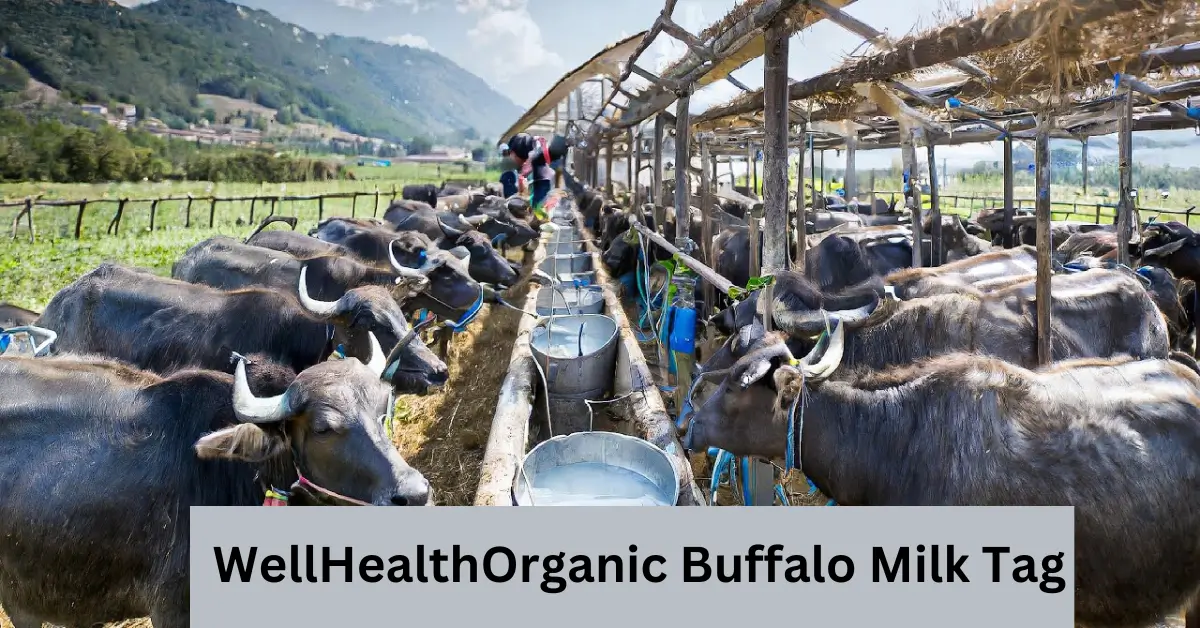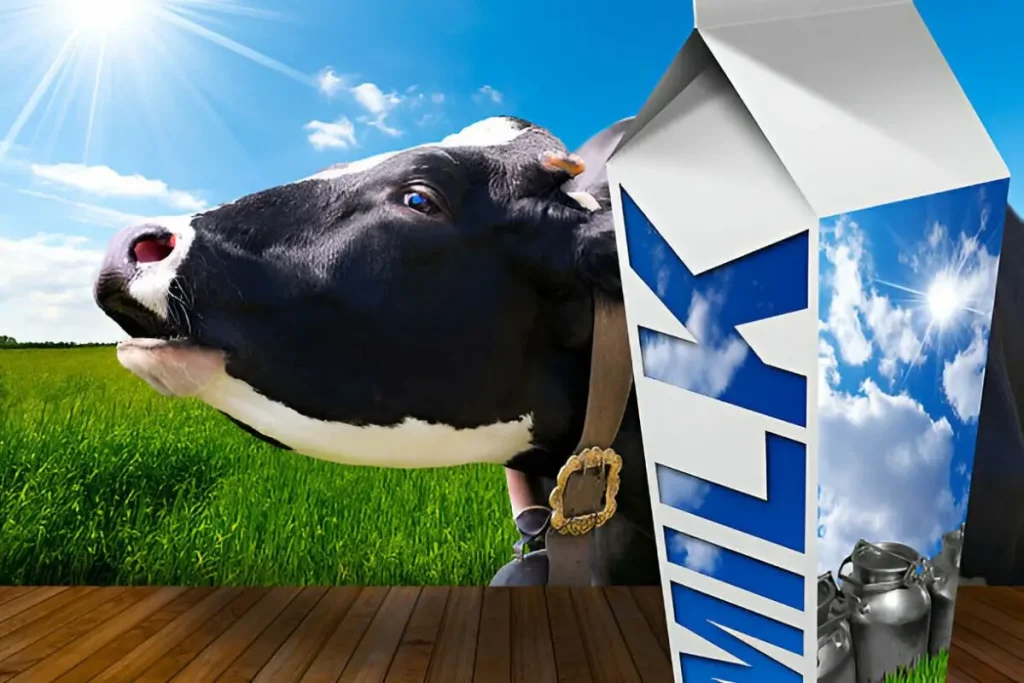
WellHealthOrganic Buffalo Milk Tag: Nutritional Powerhouse for Health & Wellness

Buffalo milk is gaining immense popularity due to its richness in nutrients, creamy texture, and various health benefits. As more people turn toward healthier alternatives, WellHealthOrganic promotes buffalo milk for its superior nutritional profile, offering a trusted source of ethically sourced and organic milk. The rise in buffalo milk consumption highlights the importance of understanding what sets it apart from other kinds of milk, especially in terms of health benefits and sustainability.
From its protein content to its rich fat profile, buffalo milk stands out in many ways compared to cow milk. Whether you’re looking for a creamier option or something more nutritious, this milk offers the best of both worlds.
In fact, according to data from 2023, buffalo milk contains nearly 50% more protein than cow milk, making it an ideal choice for people seeking higher protein intake for muscle repair and overall health. Lets explore WellHealthOrganic buffalo milk tag, benefits of buffalo milk, its nutrients and more.
Nutritional Profile of Buffalo Milk
When we talk about the nutritional value of buffalo milk, it’s hard to ignore its outstanding benefits. According to WellHealthOrganic, buffalo milk contains higher protein, calcium, and essential vitamins, which make it an excellent choice for those who want to enrich their diet.
The thick consistency and rich creamy texture are a result of higher fat content, about 7-8%, making it much creamier than cow milk, which has around 3-4% fat. This unique composition of buffalo milk makes it a preferred choice for many dishes, especially desserts and dairy products like mozzarella.
Additionally, buffalo milk is a powerhouse of essential nutrients such as calcium and vitamins A and D, which contribute to stronger bones and better overall health. Research from 2022 highlights that a single glass of buffalo milk can fulfill up to 30% of your daily calcium needs. Not only is this milk nutritionally dense, but it’s also easier to digest for some people, thanks to its different protein structure compared to cow milk.
| Nutrient | Per 100ml |
| Calories | 97 kcal |
| Fat | 6.9 g |
| Protein | 3.8 g |
| Carbohydrates | 5.2 g |
| Calcium | 195 mg |
| Magnesium | 18 mg |
| Potassium | 110 mg |
| Vitamin A | 60 µg |
| Vitamin D | 0.2 µg |
Protein Content in Buffalo Milk
Protein is a key nutrient when it comes to muscle growth and tissue repair, and buffalo milk is packed with it. A single cup of buffalo milk offers around 9 grams of protein, which is nearly 50% more than the protein content in cow milk.

This makes it a great option for athletes, bodybuilders, or anyone looking to build or maintain muscle mass. Buffalo milk’s higher protein content also makes it an excellent choice for growing children who need plenty of protein to support their development.
Additionally, buffalo milk’s protein structure is slightly different from that of cow milk, making it easier to digest for some people. According to studies from 2021, buffalo milk is also a rich source of casein, a protein that helps in slow digestion, keeping you fuller for longer. This can be especially beneficial for people looking to control their appetite and manage their weight.
High Calcium for Strong Bones
Buffalo milk is often praised for its calcium-rich profile, making it a powerful ally in maintaining strong bones and preventing osteoporosis. One cup of buffalo milk contains nearly 40% of the recommended daily calcium intake, compared to cow milk’s 30%. This is especially important for elderly people, children, and pregnant women who need more calcium to support bone health.
Research from 2023 indicates that regular consumption of buffalo milk may reduce the risk of fractures and other bone-related issues. It’s not just about calcium, though—buffalo milk also contains phosphorus and magnesium, which work together to enhance bone density and strength.
Essential Vitamins in Buffalo Milk (A & D)
Buffalo milk is not just rich in minerals but also a great source of essential vitamins. Vitamin A, vital for maintaining good vision and a healthy immune system, is present in higher concentrations in buffalo milk compared to cow milk. A study from 2022 revealed that buffalo milk contains nearly 25% more vitamin A than cow milk, making it a fantastic choice for anyone looking to improve eye health and overall immunity.
Similarly, vitamin D, known for its role in calcium absorption and bone health, is found in good quantities in buffalo milk. Drinking buffalo milk regularly can help ensure that your body gets the necessary vitamin D levels, supporting your bones and immune system. Given the rise in vitamin D deficiencies worldwide, incorporating buffalo milk into your diet can be a natural way to boost your intake.
Healthy Fats in Buffalo Milk
Buffalo milk is richer in healthy fats compared to cow milk, with a fat content ranging between 7-8%, compared to cow milk’s 3-4%. These fats include a high amount of omega-3 fatty acids, which are crucial for heart health. Consuming healthy fats from buffalo milk can help reduce inflammation, lower bad cholesterol (LDL), and increase good cholesterol (HDL). In 2021, research showed that the consumption of buffalo milk can help reduce the risk of heart disease by up to 20%.
Furthermore, these healthy fats also contribute to the creamy texture of buffalo milk, which makes it ideal for culinary purposes like creating decadent dairy products. Whether you’re preparing traditional dishes or modern desserts, buffalo milk’s fat profile lends itself perfectly to both, ensuring a richer taste and smoother consistency.
Ethical Sourcing and Sustainable Production
Ethically sourced buffalo milk is gaining traction, with companies like Amul, Mother Dairy, and Aadvik Foods leading the way in promoting sustainable dairy practices. These brands ensure that their buffaloes are treated humanely, with access to open pastures and natural feed. As more people become conscious of the ethical considerations in food production, companies that source their milk responsibly are becoming more popular. WellHealthOrganic also focuses on promoting sustainable buffalo milk, ensuring that their products are eco-friendly and support small-scale farmers.
The environmental benefits of buffalo milk production cannot be ignored. Buffaloes produce less methane gas than cows, contributing to a lower carbon footprint. Data from 2022 shows that switching to buffalo milk can reduce greenhouse gas emissions from dairy farms by as much as 30%, making it a more sustainable choice for eco-conscious consumers.
Buffalo Milk’s Taste and Versatility
Buffalo milk’s rich creamy texture makes it incredibly versatile in both sweet and savory dishes. Its naturally sweet and full-bodied flavor makes it a preferred option for preparing Mozzarella di Bufala, the famed Italian cheese, as well as South Asian sweets like kheer and rasmalai. The higher fat content allows for better cooking results, especially in desserts where texture plays a crucial role.
Besides traditional dishes, buffalo milk is increasingly being used in modern recipes. From smoothies to baked goods, its ability to enhance both flavor and texture makes it a fantastic ingredient for anyone looking to elevate their meals. Its use in international cuisine is growing, particularly in Italy, India, and the Mediterranean region, where buffalo milk-based products like cheese and yogurt are staples.
Also Read: Janey Thompson Obituary Charlotte NC
Comparison of Buffalo Milk to Other Milks
When comparing buffalo milk to other popular types of milk, such as cow milk, goat milk, and almond milk, buffalo milk stands out due to its richer texture, higher fat, and protein content. It contains 7-8% fat, compared to the 3-4% found in cow milk. This makes buffalo milk creamier and more suitable for making dairy products like butter, ghee, and cheese, particularly the renowned Mozzarella di Bufala from Italy.
From a nutritional perspective, buffalo milk has 50% more protein and higher calcium content than cow milk, making it an ideal choice for building strong bones and muscles. When compared to plant-based milks like almond milk and soy milk, buffalo milk offers significantly more nutrients, particularly in the form of essential vitamins and minerals like vitamins A & D and calcium.
While plant-based milks are often chosen for being lactose-free, buffalo milk can still be an option for those with mild lactose intolerance, as its lactose content is slightly lower than that of cow milk.
| Milk Type | Fat Content | Protein Content | Calcium | Calories | Lactose Content |
| Buffalo Milk | 6.9 g per 100ml | 3.8 g per 100ml | 195 mg | 97 kcal | Higher than cow milk |
| Cow Milk | 3.5 g per 100ml | 3.4 g per 100ml | 120 mg | 62 kcal | Moderate |
| Goat Milk | 4.1 g per 100ml | 3.6 g per 100ml | 134 mg | 69 kcal | Moderate |
| Almond Milk | 1.1 g per 100ml | 0.4 g per 100ml | 20 mg | 17 kcal | Low |
Health Benefits of Buffalo Milk
Buffalo milk is packed with health benefits, thanks to its rich nutrient profile. From promoting heart health to supporting skin vitality, the benefits are extensive. Its high levels of calcium and vitamin D make it particularly effective in promoting bone health, while the rich concentration of omega-3 fatty acids helps maintain cardiovascular function.
Additionally, buffalo milk is a good source of antioxidants like vitamin A and E, which are essential for boosting immunity and protecting against diseases.
Compared to other kinds of milk, buffalo milk is known to have more conjugated linoleic acid (CLA), which has been associated with anti-cancer properties and may aid in fat loss. Whether consumed raw or as part of dairy products, buffalo milk provides essential nutrients that can benefit a wide range of individuals, from children to older adults.
| Benefit | Description |
| Boosts Immune System | Rich in antioxidants and vitamins A & D, enhancing the body’s ability to fight infections. |
| Supports Heart Health | Contains omega-3 fatty acids and healthy fats that help maintain healthy cholesterol levels. |
| Enhances Skin Health | High in vitamin A, which supports skin repair and regeneration. |
| Aids in Muscle Growth and Repair | High protein content helps in building and repairing muscle tissues. |
| Supports Bone Health | High calcium content aids in the development and maintenance of strong bones. |
Boosts Immune System
Buffalo milk’s high vitamin A content plays a pivotal role in boosting the immune system by maintaining the health of mucous membranes in the respiratory tract and gut, which act as the body’s first line of defense. WellHealthOrganic recommends buffalo milk for its ability to enhance immunity through its rich supply of antioxidants. These antioxidants neutralize harmful free radicals and improve the body’s ability to fight infections.

Studies from 2021 reveal that buffalo milk contains immunoglobulins, proteins that are vital for enhancing immune response, making it an excellent dietary choice for those looking to strengthen their immune system naturally.
Supports Heart Health
Though rich in fats, buffalo milk contains healthy fats like omega-3 fatty acids, which are known to support cardiovascular health by lowering bad cholesterol levels (LDL) and increasing good cholesterol (HDL). The fat profile of buffalo milk has been shown to reduce inflammation and improve heart function, making it a good alternative for people looking to support heart health naturally.
According to research, regular consumption of buffalo milk can lower the risk of heart disease by 20% when incorporated into a balanced diet. The omega-3 content helps regulate blood pressure and prevents the formation of blood clots, which reduces the risk of stroke.
Enhances Skin Health
Buffalo milk is a natural source of vitamin E, a potent antioxidant that plays a critical role in skin health. Vitamin E helps to fight oxidative stress, reducing the appearance of fine lines, wrinkles, and age spots. It also keeps the skin hydrated, thanks to the healthy fats present in the milk, which provide moisture and enhance skin elasticity.
In traditional skincare, buffalo milk has been used in face masks and beauty treatments for its skin-nourishing properties. Its high-fat content makes it a suitable ingredient for dry skin, helping to retain moisture and improve skin texture.
Aids in Muscle Growth and Repair
The high protein content of buffalo milk is a major contributor to muscle growth and repair. With nearly 9 grams of protein per cup, buffalo milk is ideal for athletes, bodybuilders, and anyone looking to build or repair muscle tissue. The presence of casein, a slow-digesting protein, makes it an excellent post-workout recovery drink, as it helps in the gradual release of amino acids needed for muscle repair.
Additionally, the amino acid profile of buffalo milk, which includes leucine, is vital for muscle protein synthesis. Regular consumption of buffalo milk can support lean muscle growth while preventing muscle breakdown.
Buffalo Milk for Bone Health
Buffalo milk is rich in calcium, phosphorus, and magnesium, which are crucial for maintaining strong bones. These minerals work together to improve bone density and prevent conditions like osteoporosis, particularly in older adults. Drinking buffalo milk regularly can help meet the recommended daily intake of calcium, which is essential for maintaining bone health.
A study conducted in 2023 indicated that those who consumed buffalo milk regularly had a 30% lower risk of developing bone-related disorders compared to those who consumed cow milk.
Buffalo Milk in Different Cultures
Buffalo milk holds cultural significance in many parts of the world, particularly in India, South Asia, and the Mediterranean region. In India, buffalo milk is a staple in the preparation of traditional sweets like kheer, rabri, and gulab jamun, owing to its creamy texture and rich taste. In Italy, buffalo milk is used to produce Mozzarella di Bufala, a cherished cheese in Italian cuisine that has gained worldwide fame.
In many rural regions, buffalo milk is preferred over cow milk due to its nutritional benefits and its higher yield of butter, ghee, and other dairy products. As buffaloes are better adapted to hot climates, they have become the preferred dairy animal in various parts of South Asia.
Buffalo Milk in Traditional Dishes and Modern Cuisine
Buffalo milk is commonly used in traditional dishes across cultures. In India, it’s used in desserts like rasmalai, kulfi, and payasam. Meanwhile, in Italy, it is the star ingredient in the famous Mozzarella di Bufala. This creamy cheese is often used in dishes like pizza, caprese salads, and lasagna.
In modern cuisine, buffalo milk is being incorporated into ice creams, smoothies, and baked goods. Chefs appreciate its richness and ability to enhance the flavor and texture of their creations. As more people seek natural and nutrient-dense ingredients, buffalo milk has found its way into contemporary kitchens worldwide.
Buffalo Milk for Lactose Intolerant Individuals
Although buffalo milk contains lactose, it may be easier to digest for some people with mild lactose intolerance. Due to its protein structure and the presence of conjugated linoleic acid (CLA), it can be more tolerable than cow milk for some individuals. However, those with severe lactose intolerance should still approach it with caution.
Some studies suggest that the presence of higher fat content in buffalo milk slows the digestion of lactose, allowing individuals with mild intolerance to consume small quantities without discomfort.
How to Incorporate Buffalo Milk Into Your Diet
Incorporating buffalo milk into your diet is easy and versatile. You can use it as a substitute for cow milk in any recipe, whether you’re making smoothies, yogurt, or coffee. Its creamy texture makes it ideal for cooking and baking, adding richness to dishes such as custards, puddings, and even savory sauces.
For those looking to increase their protein and calcium intake, adding buffalo milk to your daily routine can make a big difference. It’s perfect for children, athletes, and anyone looking to maintain or improve their overall health.
Buffalo Milk Products in the Market
Today, buffalo milk is available in a variety of products, including cheese, ghee, butter, and ice cream. Mozzarella di Bufala remains one of the most popular buffalo milk products, revered for its soft texture and creamy flavor. In India, buffalo milk-based ghee and butter are household staples.

Brands like Amul, Mother Dairy, and Aadvik Foods have made buffalo milk accessible to a global audience, offering a range of products that cater to both traditional and modern tastes.
Popular Buffalo Milk Brands
In India, Amul and Mother Dairy are some of the largest suppliers of buffalo milk and buffalo milk products. They focus on delivering high-quality, ethically sourced milk to consumers. Aadvik Foods is another rising star in the buffalo milk market, known for its sustainable and organic dairy farming practices.
In Europe, brands like Fattoria della Piana and Casabianca are well-known for producing premium-quality Mozzarella di Bufala, which is exported worldwide. These brands emphasize the importance of using traditional techniques to maintain the authenticity and flavor of their products.
Environmental and Ethical Considerations in Buffalo Milk Production
Buffalo milk production is often more sustainable than cow milk production, primarily due to the lower methane emissions from buffaloes. Many brands, including WellHealthOrganic, promote sustainable dairy practices that ensure buffaloes are well-cared for and that the environment is minimally impacted.
Ethical considerations are becoming increasingly important in dairy farming, and buffalo milk producers are no exception. Many brands are focusing on ensuring that buffaloes are raised humanely, with access to open fields and natural feeding.
Storage and Shelf Life of Buffalo Milk
Buffalo milk, like other dairy products, requires proper storage to maintain its freshness and prevent spoilage. It should be stored in a refrigerator at temperatures below 4°C (40°F) to slow the growth of bacteria.
Due to its higher fat content, buffalo milk can spoil faster than cow milk if not refrigerated promptly. Unopened buffalo milk can last for up to 7 days when stored properly, but once opened, it should be consumed within 3-4 days to ensure optimal taste and quality.
For longer shelf life, buffalo milk can be processed into products like ghee, butter, or cheese, which last significantly longer when stored in airtight containers. These products can stay fresh for months if kept in cool, dark places or refrigerated. Additionally, UHT (Ultra-High Temperature) processed buffalo milk can last for several months without refrigeration, making it a convenient option for people looking for a longer-lasting dairy alternative.
Suitability for Different Age Groups
Buffalo milk is suitable for a wide range of age groups, from children to seniors, due to its rich nutrient profile. For children, the high levels of calcium and vitamin D support bone development and growth. It is also a good source of healthy fats that are essential for brain development in early childhood.
For adults and seniors, buffalo milk offers benefits like maintaining bone density, improving muscle repair, and supporting heart health. Older individuals, especially those at risk for osteoporosis, can benefit from the higher calcium content in buffalo milk compared to cow milk. However, because buffalo milk is high in fat, it may not be the best choice for individuals with certain dietary restrictions or those managing high cholesterol levels.
Potential Drawbacks and Precautions of Buffalo Milk
While buffalo milk is packed with nutrients, there are potential drawbacks to consider. The high fat content might not be suitable for people with cholesterol problems or those following a low-fat diet. If consumed in excess, the extra fat and calories could lead to weight gain and other health complications.
Additionally, although some individuals with mild lactose intolerance might tolerate buffalo milk better than cow milk, it still contains lactose. Those with severe lactose intolerance should avoid buffalo milk unless it has been processed to remove lactose. Finally, people who are allergic to casein, a protein found in all animal milks, should avoid buffalo milk, as it could trigger allergic reactions.
Quick Facts
- Fat Content: Buffalo milk contains 7-8% fat, making it richer and creamier than cow milk.
- Protein: It has about 50% more protein than cow milk, making it an excellent choice for muscle repair.
- Calcium: Buffalo milk provides higher levels of calcium, supporting strong bones and teeth.
- Health Benefits: Buffalo milk boosts the immune system, supports heart health, and enhances skin health.
- Global Use: Buffalo milk is widely used in India, South Asia, and the Mediterranean, especially in products like Mozzarella di Bufala.
- Lactose Content: While buffalo milk contains lactose, some people with mild lactose intolerance may find it easier to digest.
Conclusion
In conclusion, buffalo milk offers a range of health benefits and is packed with nutrients such as calcium, protein, and vitamins A & D. Its rich, creamy texture makes it a versatile ingredient in both traditional and modern cuisines.
From improving bone health to supporting muscle growth, buffalo milk stands out as a superior dairy choice compared to other milks. Furthermore, its use in Mozzarella di Bufala and other dairy products has made it a staple in global diets.
WellHealthOrganic champions buffalo milk for its nutritional advantages and sustainable production practices. Despite its high fat content, the benefits of buffalo milk far outweigh any drawbacks for most people, making it an excellent choice for those looking to enhance their overall health through natural and wholesome dairy options.
FAQs about WellHealthOrganic Buffalo Milk Tag
Is buffalo milk better than cow milk?
Yes, buffalo milk contains higher levels of protein, calcium, and vitamins A & D, making it more nutrient-dense than cow milk. It also has a richer texture and is ideal for making dairy products like cheese and ghee.
Can lactose-intolerant people drink buffalo milk?
While buffalo milk contains lactose, some individuals with mild lactose intolerance may find it easier to digest due to its higher fat content, which slows digestion. However, it is not recommended for those with severe lactose intolerance.
What are the health benefits of buffalo milk?
Buffalo milk supports bone health, muscle growth, heart health, and boosts the immune system. Its rich fat content also contributes to skin health by keeping it hydrated and supple.
What is the shelf life of buffalo milk?
When refrigerated, buffalo milk can last for 7 days unopened and 3-4 days once opened. Processed products like ghee and cheese can last much longer.
Is buffalo milk suitable for children?
Yes, buffalo milk is rich in calcium and vitamins, which support bone growth and brain development in children. However, its high fat content should be consumed in moderation.







